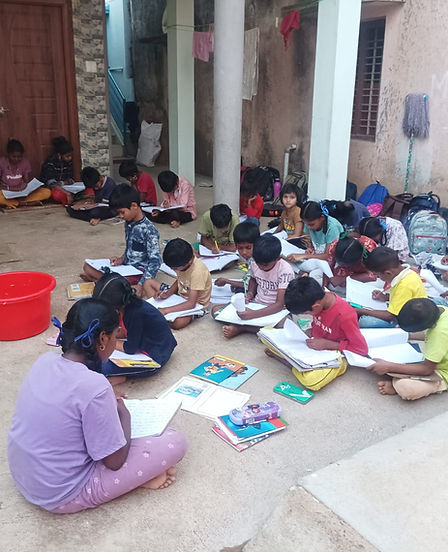
COMMUNITY
DEVELOPMENT
.jpeg)
It takes a village to raise a child. But who takes care of the village?
When we built the Shishu Mandir School in this neighbourhood, we went to meet the villagers to introduce ourselves and the school. In getting to know the villagers, we learnt that there were village-specific jobs like stone cutting and brick making. Most villagers worked under bondage, having taken loans with excessively high interest rates.
In one village, we were told that there was no creche, which made it hard for women to return to work. Setting up a Childcare Centre was our first response to the community. Second, we found that some people had a plot of land, but lacked the wherewithal to construct a house. We began to help them in house construction. Third, we formed a women’s group in each village. We were also able to offer loans to some to break away from high interest debts.
One of our earliest projects was initiating a cooperative quarry, where the bulk of the profits could go to the stone cutters. In 2008, the government announced that all quarries will be closed in this neighbourhood because of urban expansion. The quarry workers were ready to migrate in search of jobs. We knew that this would interrupt and end their children’s education. So we worked with
every quarry worker to find them alternative employment and admitted their children to our school. Having given them a reason to stay back, we were able to help build houses for some of them, and altogether, offer a secure base, from which to build their lives on. With the years, our involvement with the community has deepened.
We work closely with the village panchayat to ensure that the government schemes reach the people and the community. We view this as a very successful partnership. The land for the Childcare Centre came from the government, the community constructed a shed, and we began a centre. Where families had a plot allotted to them, we facilitated construction of a house by financing the material cost. When the government introduces new schemes, we make the community aware of them and ensure that they get what is due to them.
Some of our village initiatives are managed by our school children. Every child plants a sapling and looks after it. We are constantly advocating the perils of single-use plastic and about garbage disposal. These are communicated via street plays and rallies in the villages.
For our community, Shishu Mandir is an anchor and a place of hope. Any needy person can walk in and knows that we will try and help them.


